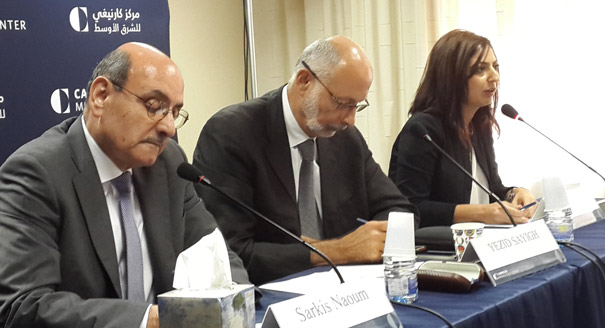Registration
Thank you!
You will receive an email confirming your registration.
Following the U.S. announcement of a strategy against the Islamic State, the Carnegie Middle East Center held a talk with director Lina Khatib and Annahar’s senior columnist Sarkis Naoum to analyze the direction of American foreign policy and the creation of an international coalition to tackle the Syrian-Iraqi crisis. The discussion addressed regional cooperation between Arab countries, especially Gulf actors. Carnegie’s Yezid Sayigh moderated.
Discussion Highlights
- Obama’s Strategy for Defeating the Islamic State: The strategy articulated by President Obama thus far is not comprehensive, Khatib said. She explained that it is missing two important components–a well-planned military strategy and a political strategy. If the Islamic State is defeated, there is still no plan to end the war in Syria and no clarification regarding how to deal with the Assad regime or the Syrian opposition’s role, said Khatib.
- The Islamic State’s Strategy: Furthermore, Khatib added, playing the victim in a defensive war is part of the Islamic State’s strategy, so it is in the group’s interest to allow the West to intervene militarily. Finally, there is a realistic concern that the strike against the Islamic State will make coalition countries targets for Islamic State reprisals, she concluded.
- A Local Solution: Even if the coalition manages to defeat the Islamic State, the group and its fighters may still be able to spread across the region and create smaller terrorist groups around the world, warned Khatib. However, Naoum argued that the Islamic State may have reached its apex. Due to its inherently sectarian nature, the jihadist group cannot easily maintain control in a non-Sunni environment, he said. Noting that the Islamic State has flourished due to sectarianism in the region, Naoum explained that Arab societies must work together to rid the region of this problem.
- Iraqi Participation: Khatib said that Iraqi government involvement would be crucial for any action against the Islamic State. However, in order for this to happen, a competent unity government must be formed to provide an alternative to the jihadist group, she said.
- Need for an International Unified Response: Any response to the Islamic State will need to involve a unified response from all participating actors, including Turkey, Iran, the United States, and the Arab Gulf, said Naoum. He warned that most conflicts in the region have now become sectarian; various states have been creating and using groups like the Islamic State to fight their battles. Khatib added that there is a major missing link to defeat the Islamic State: the role of Iran. Any solution to the Islamic State threat and the Syrian civil war will require Iran’s participation, she argued.
Lina Khatib
Lina Khatib is director of the Carnegie Middle East Center in Beirut.
Sarkis Naoum
Sarkis Naoum is a senior columnist with Annahar newspaper.
Yezid Sayigh
Yezid Sayigh is a senior associate at the Carnegie Middle East Center in Beirut.
